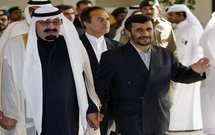 The biggest impact of the U.S.-Iranian diplomatic engagement in the Middle East is on the struggle between Saudi Arabia and Iran. Iran's international rehabilitation makes it all the more necessary for these countries, the leaders of the two main rival sects of Islam, to come to terms. An understanding of sorts will emerge in the long term, but for the foreseeable future mutual suspicions, U.S. interests and the fact that both countries are in the process of significant internal change will prevent any accommodation.
The biggest impact of the U.S.-Iranian diplomatic engagement in the Middle East is on the struggle between Saudi Arabia and Iran. Iran's international rehabilitation makes it all the more necessary for these countries, the leaders of the two main rival sects of Islam, to come to terms. An understanding of sorts will emerge in the long term, but for the foreseeable future mutual suspicions, U.S. interests and the fact that both countries are in the process of significant internal change will prevent any accommodation.
Iran's semi-official news agency, ISNA, reported April 21 that the country's second-most influential cleric, Ayatollah Ali Akbar Hashemi Rafsanjani, met with Saudi Ambassador to Iran Abd al-Rahman bin Gharman al-Shihri. ISNA quoted the Saudi envoy as saying that Rafsanjani, a former Iranian president and current chairman of the country's top strategic institution, the Expediency Council, had a "special place" in the eyes of the Saudi state and society. Al-Shihri also extended an invitation to visit the kingdom from the Saudi monarch to the leader of Iran's pragmatic conservative camp.
Despite the Saudi diplomat's statement that the policies of President Hassan Rouhani have helped improve relations between the two sides, no senior official from either side has visited the other country. There are two reasons for this. First, Riyadh and Tehran are engaged in a major proxy war in Syria. Second, the United States and Iran are negotiating toward a historic detente.
Saudi Arabia believes it can do business with Rafsanjani, Rouhani and their faction, but they aren't the ones who are calling the shots. Instead, the shots will be called by the hardliners among the clergy, led by Supreme Leader Ayatollah Ali Khamenei, and the security establishment, led by the Islamic Revolutionary Guard Corps, which controls foreign policy, especially when it comes to Saudi Arabia.
Nonetheless, Rafsanjani is the conduit for any opening between the two sides because the nearly 80-year-old ayatollah has had a close relationship with the Saudis -- in 2009, former Iranian President Mahmoud Ahmadinejad even accused Rafsanjani of conspiring with "an Arab state" to undermine his government. The Saudis and the wider Arab world can live with Iran if it returns to the policies of the Rafsanjani era. But they fear that Iran is becoming increasingly like the medieval Safavid Empire that sought to expand its control over the Arab world and was blocked by the Ottomans.
But currently, Saudi Arabia finds itself having to shoulder the responsibility of protecting the region from an Iran that was already a menace for the Arabs and now is likely to become an even bigger threat as it becomes unencumbered by international sanctions. Complicating matters, Riyadh only assumed this role after its biggest ally, Washington, started to mend ties with Tehran as part of its efforts to forge a new balance of power in the region. The United States thus has an interest in manipulating the Saudi-Iranian rivalry.
The Saudis feel vulnerable partly because Riyadh is contending with a variety of problems. As it works to counter Iran and its Arab Shiite allies, it is meanwhile trying to combat the Muslim Brotherhood, al Qaeda-style jihadists and the Syrian regime -- and it has been unsuccessful on all of these fronts. Further, the clash with Qatar has jolted the alliance among the Gulf Arab states. Meanwhile, the situations in Egypt, Yemen and Bahrain are not looking good.
Elsewhere, Turkey's interests in Syria and other regional matters have diverged greatly from those of the Saudis. In addition, Jordan, which the Saudis have relied on as a staging ground for their support for Syrian rebels, is offering resistance. All of this is happening while Iran is on the upswing.
Combined with the Saudis' concern about Iran's intentions, this regional tension makes it very difficult for Riyadh to negotiate with Tehran. There are still those within the Saudi policymaking community who do not view Rouhani as a moderate and instead share the view of Israeli Prime Minister Benjamin Netanyahu that the Iranian president is a "wolf in sheep's clothing." But unlike Israel, Saudi Arabia must deal with Iran, hence the cautious diplomatic overtures.
Amid so many challenges, the Saudis have a couple of things going for them. It will be a while before Iran can really disentangle itself from international sanctions, and the kingdom has far more cash at its disposal than Iran does. Therefore, the Saudis have some time to sort out their affairs in the Arab world. Furthermore, Iran is in the middle of a major domestic transition, which will limit its ability to project power in the region.
While not on the scale of the Iranian domestic political evolution, the Saudis are also undergoing a historic transition. Both countries' internal politics as well as regional geopolitics will further prevent them from reaching a working arrangement for some time to come. In the long run, though, they will reach an accommodation on Syria, which is in their mutual interest, and will define the balance of power in the region.
Courtesy : Stratfor (www.stratfor.com)